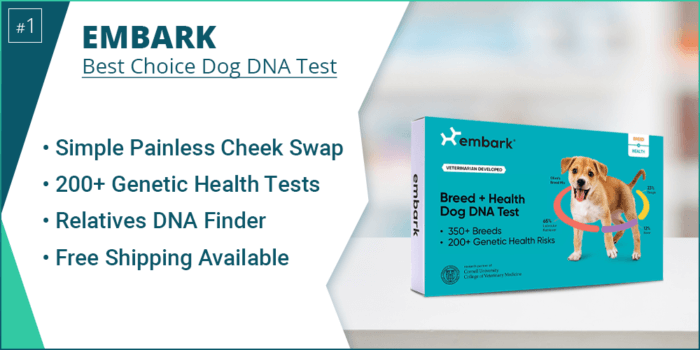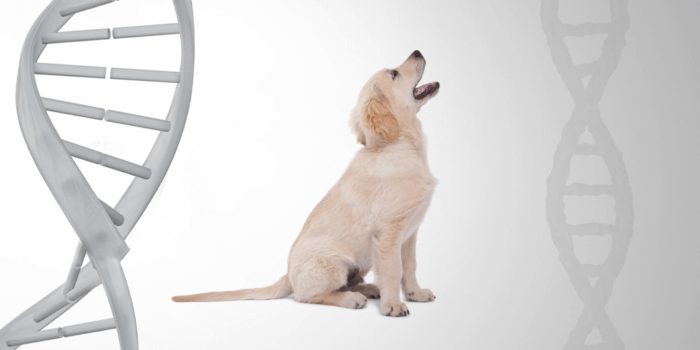- January 1, 2023
- No Comment
- 30 minutes read
Best Dog DNA Test in 2022 – Breed & Health Info From Your Pup’s … – AMNY

Tackle the city, with our help.
Manage your settings.
While most people can tell a Chihuahua from a Golden Retriever, knowing your dog’s breed is about more than just its looks and small talk chats with other owners at the dog park. There are a variety of important reasons to know the genetic makeup of your dog. From your dog’s breed mix to her health, to her behaviors and tendencies, getting your dog’s DNA tested is an easy way to gather a lot of vital info about your pup all at once.
The great news is that there are multiple test options available. But which is the best dog DNA test to choose? Our team of researchers has scoured the internet for the best of the best and has outlined three excellent options below. Hopefully, this will make it a lot easier for you to decide which is the best dog DNA test for your pet.
Our review team is comprised of researchers, writers, and dog enthusiasts who are focused on providing accurate, updated, and informative insights into the quality of canine DNA tests available on the market today.
This list is the product of hours of research to present the best dog DNA tests based on a stringent set of critical parameters. Our team of experts was very thorough in their search for the best dog DNA test kits on the market and weeded out a variety of inferior, lookalike brands to bring you the most carefully selected list, presented here. The research team eliminated less scientifically sound, lower-quality alternatives which have the potential to provide less reliable results.
Pros
- Leading accuracy
- Research-grade DNA genotyping
- Canine relative finder
Cons
What Embark Is
Embark is the best DNA dog test on the market. It will tell you the breed breakdown and genetic health profile of your pup. This helps dog owners to do things like choosing an effective diet and planning ahead for potential hereditary health issues. The Embark dog DNA test employs a research-grade DNA genotyping platform to accurately analyze 350 breeds and more than 210 health considerations related to breed and background.
What Embark Does
The Embark dog DNA test is a comprehensive genetic screening that can be used to identify potential health risks and other information about your canine companion. It can help you not only understand the primary breed of your pup but also identify secondary breeds that comprise its genetic makeup. The Embark dog DNA test is one of the first to offer a full range of tail-to-snout coverage, so you can know what’s in store for your pup before they walk out the door.
Why Embark Made This List
Our research team loved that the Embark dog DNA test includes the only “canine relative finder” as part of the service. Their canine relative finder gives you the opportunity to discover your pup’s heritage and family members through Embark’s vast DNA database.
As one of the most popular dog DNA tests available on the market today, Embark 2 in 1 was a no-brainer choice for our favorite kit. Widely viewed as one of the most accurate products on the market, it’s no surprise that this is a top contender for any pet owner in need of information about their canine companion.
Learn more at EmbarkVet.com
2. Wisdom Panel 2 in 1 – Close Second

Pros
- Most-used pet DNA testing service among veterinarians
- Veterinarian consultation included with service
- Premium upgrade unlocks additional genetic insights
Cons
What Wisdom Panel Is
Wisdom Panel is a comprehensive DNA test which can determine the breed, health status, and genetic characteristics of your pet. Wisdom Panel’s database has more than 1.7 million samples and is used to provide the most accurate results available in the market today. The test supports both cats and dogs and provides genetic insight on over 160 different breeds of animals whose lineage can be traced back for centuries.
What Wisdom Panel Does
Wisdom Panel is an innovative company that delivers one of the best DNA-based genetic tests for dogs. They analyze dog DNA via a cheek swab and provide comprehensive DNA results of more than 200 genetic and baseline health conditions. For example, with Wisdom Panel, a dog’s DNA can be analyzed to detect the presence of Lyme disease, a bacterial infection that causes painful swelling in joints. Dogs with this condition may show symptoms such as extreme loss of appetite and lethargy. The panel gives you insight into things like:
Why Wisdom Panel Made This List
We ranked Wisdom Panel second on our list of the best dog DNA test brands because of its comprehensive features, affordable entry price, and upgrade options. With this test kit, pet owners can discover information about their dog’s DNA, health, and genetic history, as well as its ancestry and heritage.
Learn more at WisdomPanel.com
3. Orivet – Worthy Mention

Pros
- Advanced, comprehensive, complete results
- Ongoing personalized health plan via the LifePlan feature included in the service
- Excellence in scientific credibility
Cons
What Orivet Is
Genopet is a dog DNA test that utilizes advanced technology and patented methods to help identify and prevent diseases in your pet. The Genopet LifePlan offers a roadmap for your pet’s health as it grows from puppyhood to adulthood, detailing essential steps towards ensuring a healthy and happy life for both you and your pup.
What Orivet Does
Orivet is the only company on the market to provide a deeply comprehensive clinical risk assessment for your pet. This assessment identifies your pup’s genetic predispositions in addition to important factors such as breed, lifestyle, age, gender and weight.
Why Orivet Made This List
Orivet operates internationally in more than 40 countries to offer pet owners, breeders, and veterinarians high-quality dog DNA testing kits. This is impressive in and of itself, but once our review team learned more about this company’s qualifications, we were blown away by its sheer scientific credibility. Orivet’s credentials include:
Learn more at Orivet.com
What Information Can I Get From a Dog DNA Test?

The best dog DNA tests provide a wide variety of high-level insights into canine heritage, breeds, and health considerations. Generally, discovering information about a dog’s breed and health risk factors is the reason for testing a dog’s DNA. Toward these ends, a DNA test can be especially helpful, as many of them (and every brand on this list) provide layers of insights previously unavailable to dog owners.
Dog DNA testing reveals much about a dog’s breed. A percentage breakdown of the main breed of your dog tops the list of the breed insights section of a dog DNA test. It is followed by a further analysis of your dog’s breed mixes. This part is generally viewed as the most fun part of the process, as it’s when a dog owner gets to find out all the different kinds of dog breeds
Knowing your dog’s breed or mix of breeds helps you anticipate potential physical needs or challenges. It’s great fun to find out that Fido is 65% pug, but there are practical health-related reasons for dog owners to want this info as well. For example, certain breeds are more prone to some genetic diseases and disorders. Fido being 65% pug means his owner should be aware of potential breathing problems from the breed’s soft palate hanging, which often leads to loud breathing sounds and sometimes problems breathing.
Mixed breed dogs may carry physical traits of more than one lineage and there are schools of thought that believe this mix of heritage makes for a healthier dog. There are, of course, other sides to the argument, such as the American Kennel Club’s article about a University of California – Davis study from Bellumori et al (2013). The study of more than 27,000 dogs found that 10 of the 24 genetic disorders examined were more prevalent in purebred pups. One of the disorders was found to be more prevalent in mixed breeds as well, but a large chunk of the disorders found little to no difference between pure or mixed breeds. 
The process of extracting DNA samples from your dog is done by using a cotton swab held on the end of a stick to collect cells from the inside of your pup’s cheek. These saliva sample cells are then sent to a laboratory for analysis where they are copied and analyzed using polymerase chain reaction (PCR) which copies and analyzes the DNA sequences for diagnosis.
The resulting genetic pattern is then compared against large databases to determine if there’s a match for your dog’s DNA.
A breed analysis report is generated in order to determine a breed type for your dog based on the information that you provide. The report will show your dog’s breed mix and may also reveal potential health risks associated with any of these particular breeds.
The results of a dog DNA test can tell you everything from what breeds they are likely to be, their genetic health risks, their weight and height estimates, how much exercise they need, and whether or not they should be kept as a pet.
The timing of dog DNA test kit results varies, depending upon the service. Results from dog DNA kits can come back in as little as a few days, especially if the service you are using has a “rush processing” option.
Otherwise, it can take anywhere from a week to several weeks for the information to be processed and uploaded for viewing. Therefore, test results are usually available anywhere from within a few days of ordering the test to a few weeks.
There are many dog DNA kits on the market, and they all outline their process in detail, including what you can expect as part of the experience. Some companies offer a timeline specific to their process that you can expect, while others offer more ways for you to receive your results. DNA testing results are usually sent to your email address, but some services offer mailed documentation as an option as well. This is a particularly important option for breeders who need to have official documentation on file for their business.
Different services produce results at slightly different rates. However, the vast majority of the best dog DNA test options will be ready within 2-4 weeks.
Are the Tests Accurate?
The best dog DNA test kits can be incredibly accurate, down to the level of the individual breed. However, even “less accurate” dog DNA tests are still able to tell the dog’s breed group. Accuracy varies depending on which markers are used as well as how many breeds are contained in the database used for comparison.
DNA tests for dogs are an effective and meaningful way to find out about your dog’s ancestry, personality traits, and medical risks. Dog DNA testing kits help owners find out about their canine companion’s lineage and can provide peace of mind for those who are worried about the cost or quality of their pet.
A dog DNA test is a genetic test that helps to find out the breed of a dog. This can give you information about what type of pet would best suit your lifestyle. Or, if you’re seeking a canine DNA test for a current pet, doing so will give you more insight into your dog’s health risks, family tree, genetic diseases, and even their personality traits!
A canine DNA test can be used to determine different dog breeds that make up the genetic mix of your pup, as well as its heritage and possible hereditary diseases. This test is able to detect the breeds that are most likely in your dog’s lineage, and also pairs of breeds that may have been crossing together in your dog’s past.
A genetic test for dogs also can help you find out more about the ancestry of your pet and what it will look like when it grows up. This can be very useful for those who want to know more about the appearance of future generations sired or birthed by your pet.
Dogs are among the smartest domestic animals in existence. They are often called “man’s best friend” because they have a loving and attentive nature and have displayed this alongside humans for centuries. However, it might surprise you to learn that there are some things that you don’t know about your dog. Among these things is their genetic history – which is complex and has been shaped by many factors over the course of more than 10,000 years.
A DNA test for dogs is a great way to find out which breeds are present in your dog’s lineage and what the likelihood is of encountering certain health conditions. The DNA test will also tell you if your dog has a genetic mutation that could result in a serious illness or even death.
Dog DNA tests utilize mitochondrial markers, which are present in the mother’s egg and not in the sperm, to look for a dog’s genetic makeup. These tests allow you to determine the best nutritional path for your pup or what caused it to develop a specific coat color. .If you have a pet that tests positive for a genetic disorder, the test can provide some insight into what could be causing it. Genetic testing also helps determine breeding practices and reduces the risk of passing on hereditary diseases.
Dog DNA testing has been around for many years now, and in the last few years it has become more popular—and more accessible—than ever. There are a lot of companies that offer this service, however, the quality differs significantly between companies.
You want to make sure that you choose the best dog DNA test in the market for your needs. The first thing you need to do is figure out what you want from the company – do you just want to know if your dog is purebred or do you want to know what mix of breeds she is?
Next, find out what type of services the DNA test offers and how much they cost. Read reviews on their website and on other websites so that you can get an idea of what people think about them. Consulting in-depth articles like this one as well as respected resources like the American Kennel Club are great steps on the path to determining what is best for you and your four-legged family member.
The benefits of a dog DNA test are many and wide-ranging. For example, it can be used to determine the breed of the dog. It can also find out whether or not the dog is purebred for certain breeds since there are some breeds that carry genetic diseases only found in their purebred counterparts.
Dog DNA tests can also be used to determine whether or not your dog has an inherited disease like canine hip dysplasia, which is common in German Shepherds, and progressive retinal atrophy, which is common in Labrador Retrievers.
In addition to this, dog DNA testing can be used to determine whether or not a dog has been spayed or neutered. This information is necessary for breeding dogs in order to know if they should get pregnant again.
The best dog DNA test kits also provide information about ancestry. This can be used to determine whether or not a dog’s parents were purebred. It is also possible for veterinarians to use this test to monitor their patients’ health. DNA samples can be obtained from sick animals and sent off for testing to find out what types of diseases they have and if they need treatment.
When it comes to interpretation of your dog’s DNA test results, each provider is slightly different. Some provide email results in clean, visual charts and graphs. Others mail official documentation that can borderline on medical “gobbledygook” in terms of heavy medical jargon. Either way, one of the first things you should look for is any indicator of mutation, as genetic mutations tend to have specific effects.
For example, if the mutation is in the MDR1 gene, then it is a gene that codes for a protein that helps break down certain drugs and toxins. Inside this protein, different variants lead to different levels of drug resistance. If your dog has this particular mutation, then it means it will be highly sensitive to certain drugs and toxins. This may mean that you can use lower doses of certain medications without harming your pup. This may also mean that certain dangerous substances and toxins can have significantly higher effects on your pal, so they would need to be accounted for and avoided even more carefully than normal.
The next step in interpreting your dog’s DNA test results is to look at these mutations and see if they have a recognizable impact on your dog’s health and quality of life. The tests can identify different possible genetic conditions or diseases, which can give you detailed information about what is going on with your pet’s health.
If you find that a mutation has implications for your dog’s health, we want to help by making sure that you can get the most out of this information in order to best prepare. To do this, we recommend talking with your veterinarian about the implications of this mutation and how it will affect their health going forward.
If you want to know if a potential dog breed is a match for your personality and lifestyle, then understanding their ancestry is very important.
There are certain breeds that match certain personalities. For example, if you have a high energy level and you want a dog that can keep up with you, then a Husky might be the right choice for you. If you want to adopt an older dog or one that is family-friendly and puts up with things like being stepped on, then a Golden Retriever may be better suited to your lifestyle. If you are looking for a dog that will be easy to train, then Labradors might be the best fit.
As far as breeds go, there are some that are more difficult to train or that might not be a good fit for your lifestyle. The following dog breeds pair with certain types of lifestyles.
Breed identification is the process of determining what breeds make up the lineage of an animal. This process can be completed in order to determine if a dog is a mix of more than one breed or to provide information about a pedigree for breeding purposes.
Conversely, ancestry testing is the process of determining which breeds and ancestral lineage make up an animal. Ancestry testing can be used to determine a pet’s heritage or create designer animals with specific characteristics that fit consumers’ needs. This type of testing, while expensive, is also very valuable because it provides a window into the past and, on a larger scale, insights into the genetic history of a species.
Dog DNA testing is also used to trace the origin of rare breeds or breeds that have been cross-bred so extensively that their original lineages are lost. This can be done by testing the mitochondrial DNA (mtDNA) or Y-chromosome. Mitochondrial DNA is maternally inherited and is found in the mitochondria of the cell.
The key difference between these two concepts comes down to the differing purposes that they serve. Breed identification is predominantly used for ownership and breeding purposes, while ancestry testing can be used for medical reasons or to determine lineage.
Breed Identification
In the context of dog breeding, breed identification is generally used to determine which breeds are closely related and may be crossed in order to produce new dog breeds or mix existing breeds. For example, the Kennel Club in the United Kingdom uses a system of identifying and classifying purebred dogs by their ancestry as well as other criteria such as appearance, temperament, and working ability. The system consists of the following categories: sporting (hunting), working, sighthounds or hounds for the hunt, non-sporting (herding and flushing), toy dogs, and spitz-type dogs. In addition to this broad classification system, the Kennel Club also has a group called Miscellaneous which contains any dog not classified in one of the above groups (such as a dermatological disease or an Irish setter).
All purebred dogs have been bred for a specific purpose, and are therefore expected to live up to that purpose. Some of their purposes include hunting, herding, draft work, retrieving, guarding, and protecting. Purebred dogs that do not live up to their intended purpose are termed “mutts,” “mongrels” or “cur dogs”. The term “purebred” has been defined in many ways, but typically it is defined as any dog that has been bred to the same standards of type and conformation. In other words, a purebred dog is more than just one breed; it must be a member of a breed that is recognized by a specific organization, in order to be considered purebred.
Ancestry Testing
Ancestry testing is used to determine the breed’s pureness within a specific breed. This could be done by comparing DNA from mixed breeds with that of the original purebred dog or to determine whether a new individual is in fact a purebred or not. A more advanced form of ancestry testing is known as genetic marker testing, which utilizes multiple genetic markers to establish the degree of admixture and its geographical origin, and then uses that data to establish whether or not a dog is in fact purebred.
Purebred is a term that has been used for dogs for centuries. As people began keeping purebred dogs, a breeding standard was developed to identify the ideal physical characteristics of that breed. Purebreds have typically been bred using a closed studbook or registry system, which is open only to the members of the breed recognized by the American Kennel Club or other similar organization. This is important because purebreds should not be mixed with other breeds, as this would dilute their genetic characteristics.
DNA testing is a way to find out more about your dog’s genetic code. It can help you know what the dog’s predispositions are for certain diseases and conditions. Knowing your dog’s genetic code can be useful in determining the best lifestyle choices for both your dog and your family.
Post an Event
View All Events…
Find a pro
Subscribe

